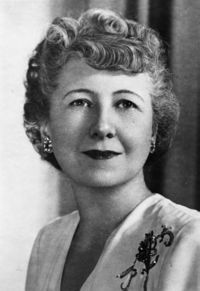Helena Flinn Ege, Gamma Epsilon, Pittsburgh (1899-1956)
As 26th President (1948-1952), Helena Flinn Ege was always alert to the changes demanded in a post-war world, but she could also focus with vision on the future. Helena believed in the old adage: “What you would one day be, you are now becoming,” which she felt could be applied to the individual Kappa and to the Fraternity itself.
A graduate of the University of Pittsburgh, the charter member and one-time President of Gamma Epsilon Chapter taught dramatics and speech, continued her studies at Northwestern, the University of Toronto, Pennsylvania State College (later University) and Carnegie Tech (later Carnegie-Mellon University) before entering the theater, playing in repertory companies from New England to Minnesota. Returning to Pittsburgh, she married Edward F. Ege. They had one son.
She was President of the Pittsburgh Alumnae Association and Beta Province President. In 1944, when Ruth Seacrest was appointed President, Helena was appointed Director of Alumnae and during her four-year term, 102 new alumna groups were added to the rolls – a testimonial to her organizational skills.
Her skills were evident, too, during her term as President. She is remembered as a flawless presiding officer; with her poise and dramatic skills, she was also a distinguished Fraternity representative as Kappa began receiving recognition from outside the fraternity world.
During her term, Kappa was invited to send delegates to the Conference on Education in the Occupied Areas, to be represented at UNESCO meetings and to participate in a Voice of America radio broadcast explaining the Dorothy Canfield Fisher French Relief Project, which had been called the “finest relief project in Europe” by the Save the Children Federation of New York.
Aware of Kappa’s influence, Helena encouraged a special award for a young Japanese woman doctor, Dr. Yaeko Kawai, to study at Bellevue Medical Center in New York, which would prepare her to help her own countrymen injured by the war. This grant in rehabilitation study was presented in honor of Harriet Ford Griswold, Beta Eta, Stanford, who had been a polio victim, and was the forerunner to Kappa’s rehabilitation program.
With the emphasis on providing financing for adequate housing of chapters, more houses for new chapters were built than ever before and older ones were remodeled. Two new chapters, Delta Phi, Bucknell and Delta Chi, San Jose State, were installed.
Kappa Kappa Gamma also needed more space, and the gracious Italianate mansion at 530 East Town Street in Columbus, Ohio, was found and purchased in 1951. Extensive renovations and changes were begun to rehabilitate it into a modern, efficient office.
After leaving office, Helena helped rewrite some of the Ritual, which she said expressed “so keenly” what she felt. At the Convention of 1956, the Pittsburgh Alumnae Association presented candelabra in her honor, an award for the chapter with the best pledge program (now New Member Program). “The Loyalty Award” was introduced and given by Helen Cornish Hutchinson, Beta Theta, Oklahoma, in honor of Helena, awarded at Convention to the alumna with a record of loyal service to the Fraternity.
Helena also served on the History Committee and staged at the 1954 Convention the first pageant of Kappa’s Great Ladies, featuring the lives of first Grand President Tade Hartsuff Kuhns and first Executive Secretary Della Lawrence Burt. She wrote for the 1956 Convention “The Boston Story,” depicting the influence of three Presidents of Phi Chapter: Charlotte Barrell Ware, Emily Bright Burnham and Bertha Richmond Chevalier; but Helena was too ill to attend and died in the fall of that year.
Additional information: 1920 census records list her as Helena K. Flinn and living with her widowed mother Katherine D. Flinn. The 1930 census has her as Helene Gregg, widowed and living with her mother again. Her death certificate lists her parents as George H. Flinn and Katherine Davis (or Daves) and her spouse as Edward F. Ege.
